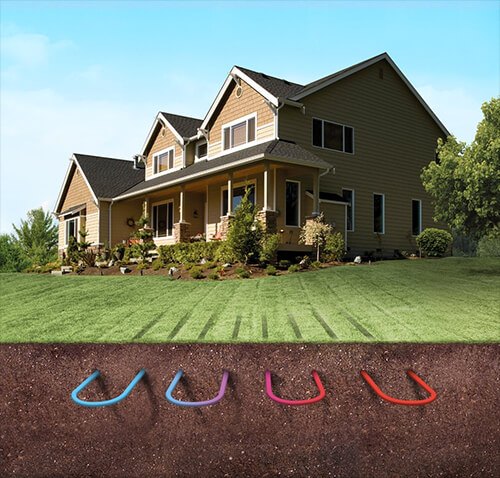
Homeowners have many options with regard to the types of appliances they choose to boost convenience and comfort. An HVAC system is no exception; electric, natural gas, and propane systems have been around for years, making homes more comfortable no matter what the season.
One technology that is coming to the foreground right now is geothermal heating and cooling. A geothermal HVAC system is a dual-function unit that provides heating and cooling services to your home using the temperature of the Earth as a heat source or heat sink. More and more consumers are choosing to install geothermal energy sources in their homes as a means of reducing their carbon footprint, increasing energy efficiency, and providing a more stable, natural source of energy for their homes.
How Do Geothermal HVAC Systems Work?
Geothermal HVAC systems use the Earth’s temperature for heat exchange. Even though air temperatures across the globe can be extreme, underground temperatures stay constant. Geothermal pumps are considered a sophisticated form of high-efficiency heat pump. They rely on the transfer of heat between the air and the ground to regulate temperatures in your home.
Both residential and commercial forms of geothermal technology exist, with commercial systems going much deeper into the earth to create power for large industrial and agricultural applications. These deep-seated systems rely on steam located deep inside the Earth that is made accessible by drilling.
Geothermal systems use the second law of thermodynamics to move heated liquid or air from warm locations to colder ones. An electric heat pump cycles water or refrigerant through a long network of underground pipes. Through this process, heat is transferred from ambient air within your home to the ground.
Winter Process
In the winter, a geothermal heat pump sends fluid through pipes where water substances increase the temperature of the fluid. This warm fluid is pumped into and circulated through your home. Cooler air is then transported back into the ground to be warmed and returned to the building for heating in a continual process.
Summer Process
Summertime brings a similar process to cooling, but this time fluid is called upon to absorb heat in the air and disburse it into the ground. This cycle works to remove heat from the air in your home, cooling your living spaces.
Advantages of Geothermal HVAC Systems
Geothermal HVAC systems are energy efficient; they use constant temperatures within the Earth to regulate temperatures in your home. While the initial price of installation is somewhat higher than a traditional HVAC system, your long-term savings on energy bills. makes it an attractive option for many homeowners. Geothermal systems have fewer parts to them, so they require less maintenance than other types of HVAC systems. Their clean, environmentally-friendly attributes make them a desirable green source of energy that will help to reduce our carbon emissions. Some people make the switch to geothermal energy due to the fact that these systems have an extremely long lifespan; they can last for decades with proper maintenance and care.
Disadvantages of Geothermal Systems
The high initial cost of installation is off-putting for many homeowners who cannot afford the extensive process of setting up. Given the fact that ground-loop systems take up a great deal of space, there may not be space to install a geothermal system on your property. In addition, geothermal systems are not as commonly used as other types of HVAC systems; you may find it difficult to locate a qualified geothermal service provider in your area. Lastly, there is a risk of leakage issues in a geothermal loop system, as well as groundwater contamination near your home.
Going forward with the installation of a geothermal HVAC system is a significant undertaking, but it can have a number of benefits that come with greater energy efficiency and reduced energy costs.
Geothermal Energy Costs
The cost of installing a residential geothermal HVAC system varies according to factors such as:
- The size of your home
- Complexity of installation process
- Location of the property
On average, the installation runs from $20,000 to $50,000. This cost can be offset by significant energy savings that you incur over time, and there may be federal and state incentives available to you as you consider this investment. Getting quotes from multiple contractors and evaluating upfront costs and benefits will help you to make the right decision for you and your loved ones.
Serving All Your Heating and Cooling Needs!
Servicing our valued clients in Chesapeake and the surrounding areas, Simmons Heating & Cooling has strategies and solutions that will solve all of your heating and cooling needs. Providing services related to heating and cooling installation, repair, and maintenance, generator repair and installation, emergency services, boiler repair and maintenance, ductwork cleaning and repair, and geothermal installation and maintenance, we are a one-stop-shop for keeping your home comfortable in all seasons. Contact us today to see how we can improve energy efficiency and reduce your energy bills with a geothermal system quote!
